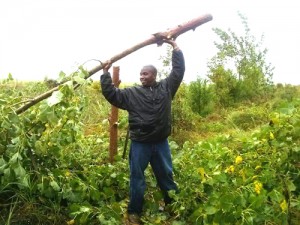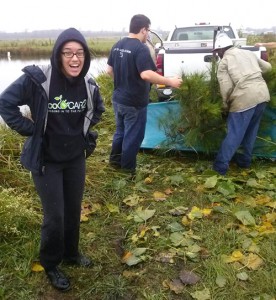Environmental Technology and Management students, Claire Basista, Kevin Heavner, Deion Oakes and Stacy Freeman, have been working with Dr. Elizabeth Nichols and Dr. Dennis Hazel to use phytoremediation at the Tidewater Research Station in Plymouth, NC.
With the heavy influence of the aquaculture industry on water, it has become increasingly important for waters to be drained periodically to eliminate effluents (produced during the life of the fish). The NC Division of Water Quality will no longer allow current practices that force the ecosystem to respond to the addition of the substances and/or lead to suffering habitats; however, there are not new treatment options in place at this time. Without new treatment solutions, this team of students and faculty are working together to test the trees to remediate and dilute these effluents into the air.

Deion Oakes, an Environmental Technology and Management student, in the process of using a tree to help eliminate effluents from the water at the Tidewater Research Station in Plymouth, NC
The team used planted species including: hybrid poplar, cottonwood, cherry-bark oak, bald cypress, loblolly pine, green ash and sweet gum to see which type(s) of trees handle and remediate polluted waters most effectively. Working with Dr. Nichols and Dr. Hazel, the group has been working to compare tree species productivity to the same species grown on other irrigation sites (i.e. municipal wastewater application sites).
Through this experience, the students have accepted the challenge to apply the technical knowledge of their curriculum to the practical experience of field work in an effort to become more well-rounded, informed and capable to jump into their career field upon graduation.


